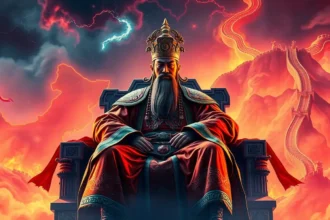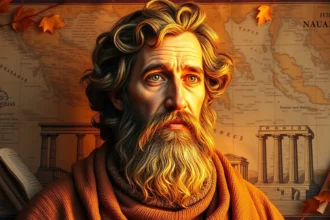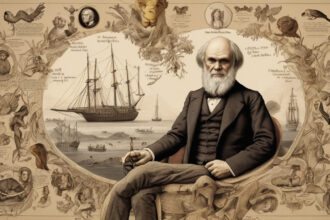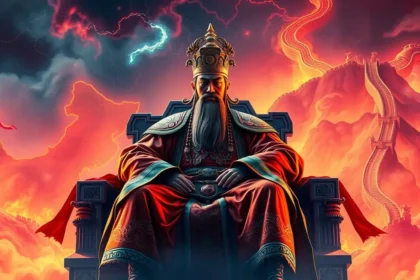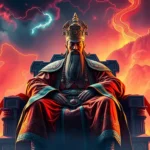Confucius, the legendary Chinese philosopher and teacher, stands as a beacon of wisdom whose teachings have influenced civilizations for over two millennia. His ideas on ethics, governance, education, and personal virtue form the bedrock of Confucianism, a philosophical system that continues to inspire individuals and societies. One of his most celebrated quotes, “It does not matter how slowly you go as long as you do not stop,” exemplifies his philosophy of perseverance and self-improvement. In this article, we delve deeply into the life and legacy of Confucius, exploring every facet of his journey, from his humble beginnings to his immortal contributions to humanity.
The man who asks a question is a fool for a minute, the man who does not ask is a fool for life.
Confucius
Early Life and Background
Humble Beginnings
Confucius, born Kong Qiu (孔丘) in 551 BCE during the Spring and Autumn period of Chinese history, came from the state of Lu (modern-day Shandong Province). His family was of noble lineage but had fallen into poverty by the time of his birth. His father, Kong He, was a military officer who passed away when Confucius was only three years old. This left his mother, Yan Zhengzai, to raise him in difficult circumstances.
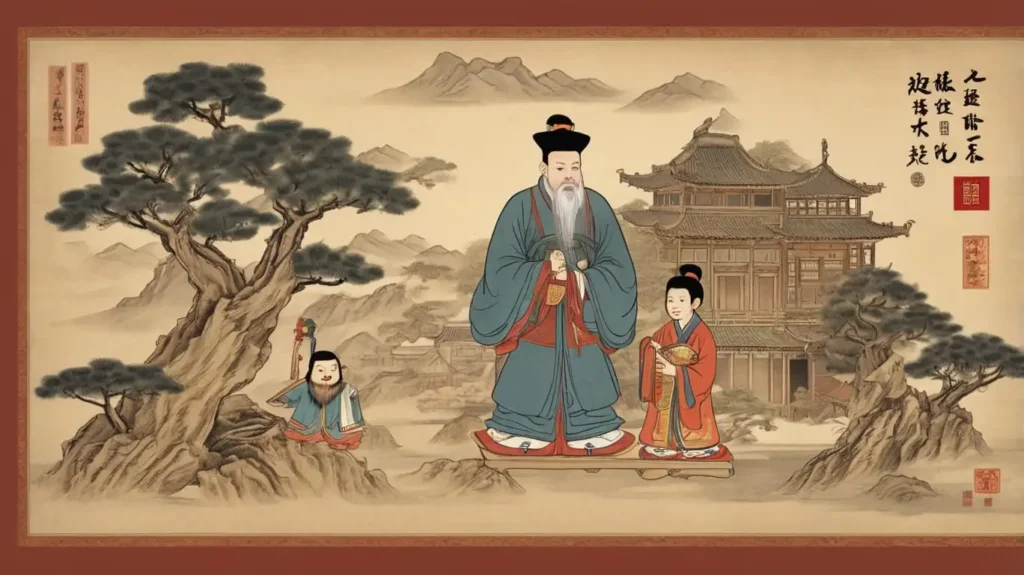
Despite financial hardship, young Confucius showed an early thirst for knowledge. His mother played a crucial role in instilling in him a love for learning and a sense of moral responsibility. He received a modest education, which he supplemented through relentless self-study. These formative years shaped his values of diligence and resilience.
Confucius’ Quest for Knowledge
Education and Self-Learning
Confucius believed that education was the key to personal growth and societal harmony. With limited resources, he mastered subjects ranging from history and literature to music and ethics. His intellectual curiosity was boundless, and he sought wisdom from diverse sources, including ancient Chinese texts such as the Book of Songs (Shijing) and the Book of History (Shujing).
Early Career
Confucius began his career in public service as a minor bureaucrat overseeing grain and livestock. His dedication and innovative methods quickly gained him recognition. He sought to apply his understanding of moral virtue and governance to reform society, but his ambitions were often met with resistance due to political instability and entrenched corruption.
Philosophy and Teachings
Core Beliefs
Confucius developed a system of thought emphasizing virtue ethics, focusing on moral integrity, respect for tradition, and harmonious relationships. Key principles of his philosophy include:

- Ren (仁): Humaneness or benevolence.
- Li (礼): Proper conduct, rituals, and social etiquette.
- Yi (义): Righteousness and justice.
- Xiao (孝): Filial piety, or respect for one’s parents and ancestors.
His teachings were not rooted in religious dogma but in practical wisdom. Confucius envisioned a society where individuals acted virtuously and rulers governed with moral rectitude.
The Analects: A Legacy of Wisdom
Confucius did not write extensively; instead, his disciples compiled his teachings into a text known as the Analects (Lunyu). This collection remains one of the most influential works in Chinese literature and philosophy. Key excerpts from the Analects include:
- “The man who moves a mountain begins by carrying away small stones.”
- “When we see men of a contrary character, we should turn inwards and examine ourselves.”
Through these teachings, Confucius emphasized self-reflection, perseverance, and the importance of lifelong learning.
Challenges and Wandering Years
Political Obstacles
Confucius sought to influence rulers and implement his ideals of governance, believing that a virtuous leader could inspire moral behavior in society. However, the fractured political landscape of his time—marked by wars between feudal states—rendered his efforts futile. Many rulers prioritized power over virtue, and Confucius faced repeated setbacks.
Our greatest glory is not in never falling, but in rising every time we fall.
Confucius
Exile and Travels
In his early 50s, Confucius left his home state of Lu and spent over a decade wandering through neighboring states. Accompanied by a group of loyal disciples, he engaged in philosophical debates, advised rulers, and sought to spread his vision of ethical governance. Despite enduring poverty and rejection, Confucius persisted, embodying his own teaching of never giving up.
Later Years and Death
Return to Lu
In his final years, Confucius returned to Lu, where he focused on teaching and editing ancient texts. He played a pivotal role in preserving and transmitting China’s cultural heritage, including the Five Classics:
- Book of Songs (Shijing)
- Book of History (Shujing)
- Book of Changes (Yijing)
- Book of Rites (Liji)
- Spring and Autumn Annals (Chunqiu)
Confucius passed away in 479 BCE at the age of 72. Although he died without seeing his ideals fully realized, his legacy endured through the efforts of his disciples.
Confucianism: The Enduring Philosophy
Influence on Chinese Society

After his death, Confucius’ ideas gained prominence during the Han Dynasty (206 BCE–220 CE), when Confucianism became the official state ideology. His teachings influenced every aspect of Chinese life, from education and family structure to governance and social norms.
Global Impact
Confucius’ philosophy transcended China, inspiring cultures across East Asia, including Korea, Japan, and Vietnam. In the modern era, his ideas continue to resonate in discussions on ethics, leadership, and personal development.
Lessons from Confucius
Confucius’ life and teachings offer timeless lessons:
- Perseverance: His quote, “It does not matter how slowly you go as long as you do not stop,” encapsulates the value of persistence. Whether facing adversity or pursuing self-improvement, steady effort leads to progress.
- Moral Integrity: Confucius believed that a virtuous character was the foundation of a fulfilling life and a harmonious society.
- Lifelong Learning: His insatiable quest for knowledge reminds us that education is a lifelong journey.
- Empathy and Relationships: By promoting values such as Ren (benevolence) and Xiao (filial piety), Confucius highlighted the importance of empathy and respect in building strong relationships.
Breaking Down the Barrier
Confucius’ enduring legacy lies in his ability to inspire humanity across centuries and cultures. His life serves as a testament to the power of persistence, humility, and the pursuit of wisdom. By following his teachings, we can strive to create a more ethical, compassionate, and harmonious world.
Confucius once said, “The superior man is modest in his speech, but exceeds in his actions.” Let us honor his legacy not just through admiration but by embodying his principles in our daily lives. His philosophy, rooted in timeless truths, continues to guide us in the journey toward personal growth and societal harmony.
Additional Resources
Here are additional resources related to the life, teachings, and legacy of Confucius, offering deeper insights into his philosophy, historical context, and enduring influence:
Books and Biographies
Confucius: And the World He Created by Michael Schuman
An accessible exploration of Confucius’ life and how his teachings shaped the world.
The Analects of Confucius (Various Translations)
The foundational text of Confucian philosophy, filled with his sayings and teachings.
Confucius: A Biography by Jonathan Clements
A detailed look into the life of Confucius and the socio-political environment of his time.
Confucianism: A Very Short Introduction by Daniel K. Gardner
A concise yet comprehensive overview of Confucian thought and its modern relevance.
Online Articles and Encyclopedias
Stanford Encyclopedia of Philosophy: Confucius
A scholarly yet readable article examining Confucius’ philosophy and its historical significance.
BBC History: Confucius
A concise overview of Confucius’ life, teachings, and his influence on Chinese culture.
Internet Encyclopedia of Philosophy: Confucius
An in-depth examination of Confucian thought and its evolution over centuries.
Ancient History Encyclopedia: Confucius
Covers Confucius’ life and teachings in an engaging and accessible manner.
Free Online Texts and Audiobooks
The Analects of Confucius
Available in multiple formats, providing access to his teachings for free.
Confucius’ Doctrine of the Mean
A key Confucian text emphasizing balance and moderation.
The Great Learning
Another Confucian classic focusing on self-cultivation and governance.
Documentaries and Videos
Confucius (2010)
A biographical film dramatizing the life and struggles of Confucius.
Confucius and the Birth of Chinese Thought
A documentary exploring Confucius’ philosophy and its impact on Chinese history.
The Teachings of Confucius (Great Courses)
A series of lectures examining Confucian ideas and their relevance today.
Academic Articles and Scholarly Resources
JSTOR: The Legacy of Confucius
A collection of scholarly articles analyzing the impact of Confucius’ teachings.
Academia.edu: Confucian Philosophy and Ethics
Access academic papers on Confucius’ life, philosophy, and influence.
Nature: Confucianism and Modern Thought
Explores the intersection of Confucian philosophy and contemporary issues.
Cultural and Educational Resources
Confucius Institute Online
An international hub for learning about Confucius, Chinese culture, and language.
The Kong Family Mansion and Temple in Qufu
Learn about the historical sites dedicated to Confucius in his hometown.
Asia Society: Confucianism Resources
A curated collection of articles and educational materials on Confucius and Confucianism.
These resources offer a rich, multifaceted understanding of Confucius’ life and the profound legacy of his teachings.
Must Read : Life of Charles Darwin



